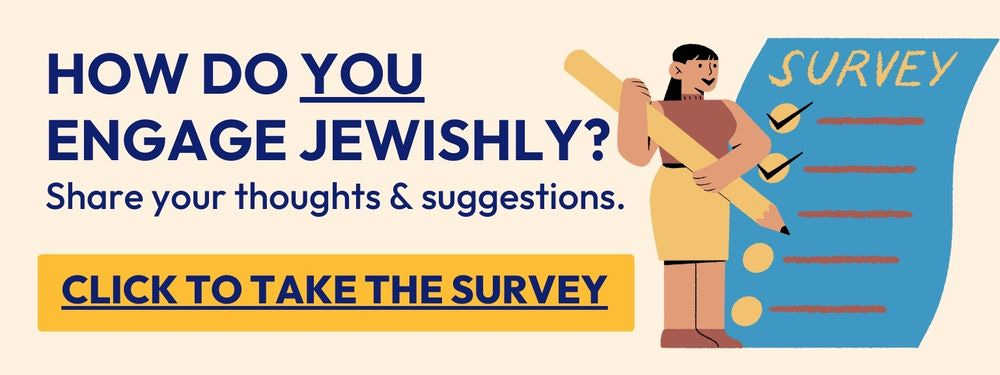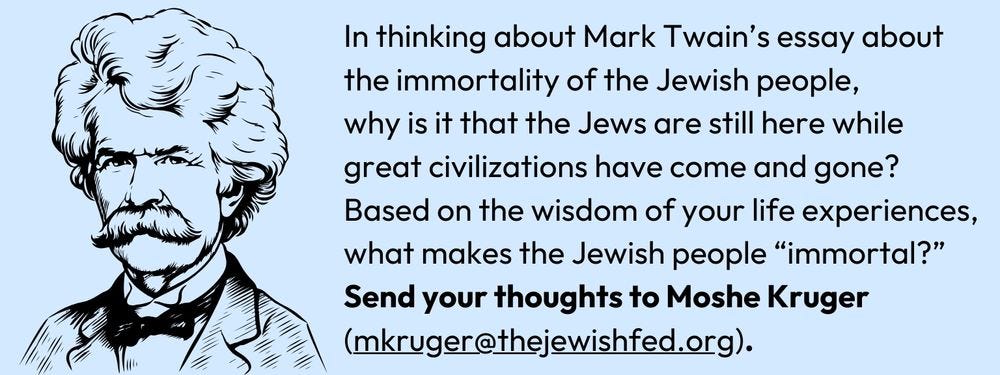Hope in a Year of Change
Amidst a year of profound challenges, the Jewish community finds renewed hope and engagement, sparking a renaissance of identity and resilience.
What a day…what a year!
Today, two days before Thanksgiving, as I write this edition of Minute with Moshe, Israel approved a U.S. brokered ceasefire with Hezbollah, aiming to end more than a year of active conflict along its northern border with Lebanon. While the outcomes of this ceasefire in the North are unknown, what is clear is the events of the past year have been incredibly challenging and mentally exhausting for the Jewish people.
We’ve faced the horror of the NOVA massacre, the abduction of Israeli hostages, the ongoing war in Israel, conflicts on college campuses, and a sharp rise in antisemitism. Yet, even in the face of such hardships, we have found reasons to be hopeful.
In Judaism, “hope” (represented by the Hebrew word “tikvah”) is considered a central value, signifying the belief that even in the face of adversity, one can actively work to create a better future and never lose faith in the potential for positive change. Tikvah is seared into every aspect of Jewish identity and resilience throughout history; it’s not just passive optimism, but a commitment to action to improve the world around us.
Our hopes and tears during this turbulent year of crisis has sparked a remarkable resurgence in Jewish identity and communal participation. A recent study from the Jewish Federations of North America reveals Jews are rediscovering their commitment to their identity and are seeking ways to connect more deeply. Across every facet of American Jewish life—synagogues, JCCs, schools, Federations, and camps – there’s been a surge of engagement.
Astonishingly, of the 83% of Jews who were only “somewhat,” not very,” or “not at all engaged” in Jewish life before October 7, nearly 40% are now participating more actively. This group represents about 30% of all Jewish adults—roughly double the proportion of those who previously considered themselves “deeply engaged.”
This renewed interest begs the question of how we leverage this moment to embrace our Jewish identity and lead a renaissance of Jewish pride and determination. Jewish communal leaders are filled with tremendous hope to parlay this renewed engagement into solving critical Jewish priorities, such as:
Securing the future of the Jewish people and creating vibrant local communities
Developing meaningful content-rich programs to enrich our communities and strengthen Israel; and
Ensuring the next generation carries forward Jewish life and its expanding tapestry of experiences, ideas, and traditions
Like the world’s Jewish community, South Bend is a mosaic of Jews representing various backgrounds, beliefs, and identities. We may hold differing views about Israel, its government, politics, and the ongoing crises, but the connection to Israel profoundly impacts our Jewish identity as the JFNA engagement survey suggests.
With this in mind, your local Fed is curious to know how this surge in engagement playing out in cities across America is unfolding in our community.
Post October 7 are you:
Participating more actively in Jewish life? And if so, how are you engaging?
Finding meaning, spirituality, and a deeper connection to a larger purpose than yourself?
Finding what you are looking for? If not, what are you seeking in terms of connection?
With these questions in mind, please take our short online survey to help us better understand this moment of engagement—our tikvah.
Community Challenges & Opportunities in South Bend
From Israel experiencing the most catastrophic and traumatic year since it was founded; to the entire global Jewish community being hit by a tsunami-size wave of antisemitism and anti-Israel sentiment; to the growing number of South Bend community members taking stock of the most consequential issues facing our Jewish community’s future, your Federation is here to advance an inclusive, engaged, and equitable South Bend community through a values-driven mission.
The coming months will have exceptional significance for us—as we determine the path forward for our Jewish community. In navigating our future, let’s embrace dialogue with an open mind, grace, and sensitivity knowing that we may have differing views on a given issue, often with deep-rooted passion and commitment.
What’s at stake is nothing less than our future—and it is this precious jewel that gives me the confidence that each of us will show remarkable courage, resilience, and determination in our community planning conversations.
In 1899, Mark Twain penned a famous essay entitled “Concerning the Jews.” Twain wrote:
“The Egyptian, the Babylonian, and the Persian rose, filled the planet with sound and splendor, then faded to dream-stuff and passed away; the Greek and the Roman followed, and made a vast noise, and they are gone; other peoples have sprung up and held their torch high for a time, but it burned out, and they sit in twilight now, or have vanished. The Jew saw them all, beat them all, and is now what he always was, exhibiting no decadence, no infirmities of age, no weakening of his parts, no slowing of his energies, no dulling of his alert and aggressive mind. All things are mortal but the Jew; all other forces pass, but he remains. What is the secret of his immortality?”
Dear readers, with 5,000 years under our belt, what do you think our Jewish secret is? I’m interested in publishing an anthology of your answers—a curated collection of enduring words of wisdom. Perhaps this compendium could be our collective birthday gift to the Federation as it celebrates its 80th anniversary in 2025. To get this project started, you’re invited to share your “Enduring Words of Wisdom” by email me at mkruger@thejewishfed.org.
What do I think our secret sauce is?
Let me respond in three words:
Unity without Uniformity.
This term resonates with me—it is a passionate idea that moves me greatly. This concept gives us the ability to create an expansive pluralistic community—one that welcomes all expressions of Jewish life. The depth and breadth of this one discerning community objective makes it foundational to our entire community-building effort.
You may have heard me say before, that at the core of our community-building effort is the creation of a Campus for Jewish life where the whole is greater than the sum of its parts. The vision for this Campus includes a welcoming, spirited, and collaborative “synagogue village” that reflects Sinai’s and Temple’s blueprint for a reimagined future that is inclusive, non-judgmental, and warmly welcomes all Jews regardless of their affiliation wishing to observe, learn, and enjoy Judaism regardless of background or personal level of observance.
But it can be much more…when fully developed, the Campus enterprise, our village, will be an oasis of learning, prayer, and respectful exchange—but also an incubator for arts and ideas—a space to celebrate, engage in Jewish life, and intertwine with the broader Jewish world.
Unity without Uniformity is our sacred challenge to make Jewish life meaningful, relevant, and joyful for today and to empower and inspire the next generation to see their identity as something they cannot imagine living without.
At this critical moment, we have an incredible opportunity. This is the most difficult period we’ve faced in decades, yet it offers us the chance to broaden the reach of our community, provide profound meaning to so many, and not merely return to “normal.” Maintaining the status quo is not the best strategy for our future success.
At the risk of being misunderstood, we need an injection of new thinking in our comprehensive strategic planning effort. How we as a community respond now has the potential to shape the Jewish future for generations to come.
Let us rise to this moment.
Moshe Kruger
Executive Director
574-233-1164 x1802
MKruger@TheJewishFed.org
We Are Stronger Together
With the end of 2024 just a few weeks away, now is the time to consider some tax-wise charitable giving strategies.
It’s not too late to make an impactful donation that benefits our Jewish community now and for years to come. There are many tax-smart ways to do so before year-end including:
Gifts of appreciated assets (stocks) to receive a tax deduction for the full fair market value of the assets while avoiding paying capital gains tax
Creating or adding to a Donor-Advised Fund, which is like a philanthropic checking account to manage your charitable giving now and over time
Utilizing the IRA Charitable Rollover if you are 70 1/2 or older to transfer up to $105,000 to Federation tax-free
Donating appreciated real estate to avoid capital gains tax on the sale and receive a charitable income tax deduction
To discuss these and other charitable giving strategies, please contact Moshe Kruger, Jewish Federation Executive Director, at (574) 233-1164 x1802 or email mkruger@thejewishfed.org, or consult your tax and financial advisors.





